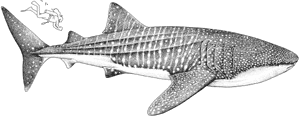International Whale Shark Project

This project incorporates a Whale Shark Awareness Distinctive Specialty that gives divers essential knowledge and skills to dive or snorkel responsibly with Whale Sharks and to obtain valuable information or photographs. To compliment this project, a Whale Shark Photo Identification web site has been created to which divers and snorkelers are encouraged to report their sightings. It has been designed to help divers to contribute vital information to researchers studying whale shark migrations and producing the information that is essential for the protection of these huge, harmless animals. Each photo submitted will make a genuine contribution to the understanding and future conservation of these magnificent creatures.
By taking part in this project, you will learn more about the biology, behavior and distribution of the world’s largest fish. You will become familiar with the proper techniques for recreational diving whilst encountering whale sharks with minimal impact on the sharks’ habitat and behavior, enabling you to plan, organize and execute a dive with whale sharks in a safe and passive manner. Your help with this project will aid conservation and management of whale sharks, as you will recognize the importance of whale shark monitoring activities. Through the Whale Shark Photo ID web site, you will have the unique opportunity to participate in whale shark conservation by reporting your sightings.
Visit www.whalesharkproject.org to find out how you can help be a part of this project.

· Do not attempt to touch, ride or chase a whale shark
· Do not restrict normal movement or behaviour of the shark
· Maintain a minimum distance of 3 metres from the whale shark
· Do not undertake flash photography
· Do not use underwater motorised diver propulsion
















